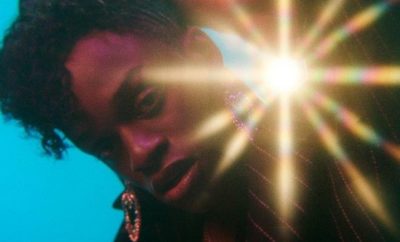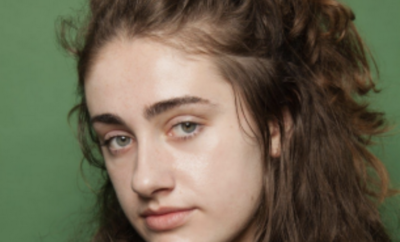
Interviews
Madeline Grey DeFreece – Tahara
By: Lisa Steinberg
Q) In the beginning we are treated to one of the most incredible non conversation conversations. The looks, expressions, and eye exchanges between you and Rachel [Sennott] are absolutely exceptional. Talk about how you constructed together this unspoken chemistry that was all about the expression over the delivery of dialogue.
A) That scene specifically is personally one of my favorites. That scene was just so fun to work with Rachel. It’s almost like a fun acting challenge. How can we both make our points completely non verbally? It was just so fun and also Rachel has a comedy background, so she was giving so much to that scene. It was so fun. I was like I can just organically react. Building that friendship along with Rachel was so fun. We always say in interviews how we just met at our costume fitting the day before shooting and then we were like okay, we are supposed to be best friends in this so let’s go be friends. We went to dinner and we would hang out and we got to go to Niagara Falls. It’s like we are shooting an indie film and everything, but we are like okay, we are in Rochester let’s all go to Niagara Falls. It was just great to build that organic real relationship off set. It ended up really reflecting beautifully on screen.
Q) “Tahara” is observing cleanliness of the soul, the clothes and the surroundings. But there is nothing clean or pure about what happens throughout this one day we see unfold within the film. It’s all about lies, deceit, and manipulation. How does the meaning of Tahara really contrast with this toxic relationship that we see within the movie?
A) Tahara is the ritual of cleansing the body for burial and I would talk to Jess [Zeidman] more about this, but this entire day is kind of dealing with grief and then at the same time all of these like you said impure things that are happening. But at the end, after a long day of abuse by Hannah, it is kind of like let me remove this toxicity from my life. And it is almost like maybe Carrie is blocking out and shedding this toxicity and she is clean now and from this point on she can be authentic like she so desires to be and so desires that everyone else around her is.
Q) We have this final scene in the library at the end of the film where death in a sense kind of comes full circle. It’s Samantha’s passing and funeral, but also this death of the friendship between Hannah and Carrie that we see at the end.
A) Yeah, it’s heartbreaking.
Q) To have sixteen years of your life spent with someone and have that feel like a shedding and purifying yourself from that person is a huge life changing event in your formative teenage years. There are people who carry those kinds of people like Hannah in their lives forever and never let them go.
A) Yeah. It’s funny that there are some people who hold on to that, but it’s also kind of ritualistic. When you graduate high school and you get rid of those things at each stage of your life.
Q) The start of the film is an Insta identifier, now a days it’s not news or didn’t happen unless you have Insta’d it. Our insta footprint is everything. Talk about how the films Insta footprint is like a pathway to the focus we see within the film wherein they are kind of like our enemies and our friends at the same time just as much as we kind of see on screen between Hannah and Carrie.
A) Exactly that. Also, being shot in that square, that square frame, it kind of shows almost like how condensed and isolating things are. That this is your emotional space and this is what people are seeing and this is what you are allowed to feel in these constraints and how that alone can just be so isolating. I think with the relationship with Carrie and Hannah, I think it’s almost like they are trying to maintain something real. It’s kind of a fact Carrie’s constant need or want for authenticity and that with Hannah it’s like as long as everybody sees what happened whatever I did, if I want Tristan’s (Daniel Taveras) attention I am going to do this, but when he’s not looking nothing else matters. But, oh, he saw me fall out of my chair and that’s on display. It kind of isolates those moments and allows them to connect a lot of the time. I think that’s one of the places where there is a rift in that separation.
Q) Is there anything you have taken away from being a part or hope viewers take away from watching the film?
A) I think one of the things that I love the most about this film is that it tells this really honest coming of age story. It’s something that I had never read or saw before this film. Of course, as adults we can go back and think, “Oh my gosh, we really did hold these things with such weight and such high stakes,” but what I look back to that younger version of me I hope that younger folks see that my feelings are validated and I am seeing myself on screen and being able to really know that someone identifies with what they are feeling.





You must be logged in to post a comment Login